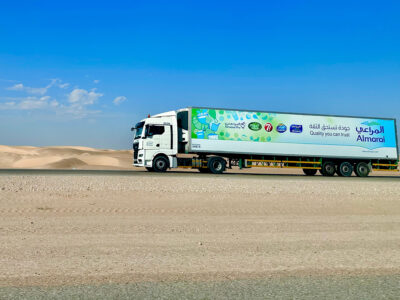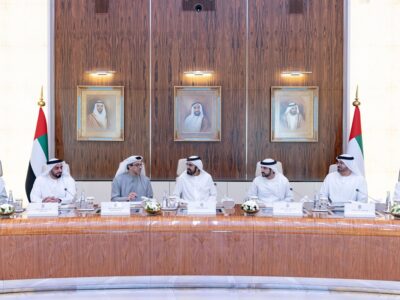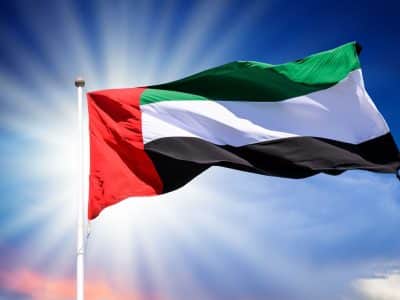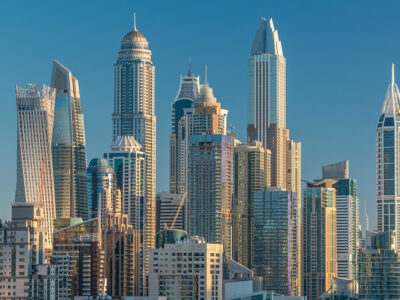I want to sell ice to the eskimos,” mohi-din BinHendi cackles. “No, really I want to go to America and franchise my own brands,” he backtracks.
Those who have ever met the Emirati businessman will know there is likely to be some truth in his Eskimo statement. The man behind one of Dubai’s most successful retail conglomerates, the eponymous BinHendi Enterprises, didn’t get to where he is today without thinking big.
BinHendi opened Dubai’s first designer brand, Pierre Cardin, in the emirate more than 40 years ago and has since gone on to establish one of the country’s oldest conglomerates. With business interests spanning everything from property to fashion and hospitality across the UAE, India and other Gulf states, the privately-owned company generates millions of dollars a year in revenues.
Now, having spent the last four decades introducing some of the world’s most luxurious brands such as Hugo Boss, Nicole Farhi and Porsche Design to the Gulf, BinHendi is turning his business model on its head and hoping to sell his own brands abroad. Enter the subsidiary 7Franchise Group, operator of several of BinHendi’s own-branded cafes such as Second Cup, Japengo Café and Havana Café, which he established late last year in a bid to become the largest franchiser in the Gulf.
“I have come to the conclusion that getting franchises from outside [the region] does not mean that we are doing any creative work but rather bringing a success story back here. I have decided that I want to make my own success story within my country,” he explains.
“The GCC might not be as big as America in terms of market share, volume or population but [retail] is an important pillar for growth and it’s a significant area with significant appetite for opening businesses.
“If I operate these brands successfully then there is no reason for them not to be successful in any other country,” he adds.
BinHendi hopes that 7Franchise Group, which currently operates only a few stores across the region, will become a significant player in the BinHendi Enterprises portfolio. Last month he opened Now Café in Dubai Mall and plans are already under way to expand its Extreme Shawarma and Rockstar Café brands across the UAE. Over the next five years, BinHendi hopes to open up to 100 stores and restaurants across the region under the 7Franchise Group umbrella.
Article continued on next page
“It’s going to be a very vital part of our business. Let’s put it this way; I have no competitors [in the market] today. I am the only one with so many brands that I can really launch into the market and more and more families want to get into the [F&B] business. Almost everyone I know wants to open a restaurant or be in the F&B business, either on a small or large scale,” he says, adding that he expects it to become a multi-million-dirham business.
Set BinHendi’s plans against the current economic backdrop in the region and his plans make sense. Dubai is enjoying a retail and tourism boom, in part due to its safe-haven status amid the regional political turmoil. The emirate reported more than 5 million visitors to the city in the first half of 2012, according to the latest available figures, and most of those headed to the malls to shop.
Emaar, owner of the world’s biggest shopping mall, said the number of visitors to its Dubai Mall increased by almost half a million people to 5.2 million last year while the number of brands sold in its stores increased 25 percent.
Concentrating his efforts on the food and beverage sector could also be a wise move. Demand for fast casual dining is growing amid a rise in disposable income, extravagant shopping malls and a seemingly unquenchable appetite for Western food concepts. The UAE’s fast casual dining sector is expected to grow from $6.4bn in 2011 to $8.7bn by 2015 with burger chains set to see the biggest increase, according to research firm Euromonitor.
Whether it’s food and beverage or designer clothing, BinHendi is confident that Dubai is back with the businessman predicting more tourists than ever to descend on the emirate this year.
“We went through the bad times when the whole world’s economy was down but today it is bouncing back. We learned our lessons, the bubble days are over and the [infrastructure] plans that are being announced are well-studied,” he says with confidence.
“The banks are also funding new [projects]. They used to be [more] lenient but now you have to verify your project and really show on your balance sheet and projections within the third and fourth year. The time is right for building the city; we haven’t even done half of it, there are still so many more things to be done before we see a fully-matured city,” he adds.
BinHendi is keen to exploit this to his advantage, expanding his fashion portfolios to include more children’s and womenswear brands as well as introducing new designer products and refurbishing existing stores. BinHendi’s overall business reported a 15-20 percent increase in sales in 2012 and he expects to boost sales this year
by 23 percent as tourists from the GCC, Russia and China continue to flock to Dubai to purchase designer clothes and other luxury goods.
“We are looking at more for the ladies and children. Our portfolio will be complete with all of the three sectors of the business; men, women and children,” he says.
Article continued on next page
He adds that the firm is in early talks with several American and European luxury brands to expand their business in the Middle East.
New stores, however, could be hampered by the availability of premium mall space in Dubai, he warns. “One of the biggest problems in the market at the moment is [finding a] location. Everyone wants the Louis- Vuitton-type of location; they all want the best but there is only so much that can be offered in the market.”
BinHendi says he will go to the debt market to raise money for his expansion plans but he certainly won’t be following in the footsteps of any of his regional peers and look to float his shares on a stock market — not now or ever. “I haven’t seen many people really fly high by making their companies public,” he says, adamantly.
“Instead after years of working they end up reporting to another thirteen board members — why would I do that? I don’t want to work for anyone, I work for myself. What happens in the future is up to the next generation; they are the guardians of the future,” he adds.
BinHendi promoted his eldest daughter, Amna, as CEO of the company some years ago while his other daughter, Aziza, heads up the firm’s retail fashion department. They may be family but BinHendi made both of them prove themselves before they were given the jobs and their father is more than confident that they — along with the rest of the BinHendi Enterprises staff — will continue to manage the family-owned company long into the future.
“I feel very confident that the people that are involved with me and the family can manage,” he says.
One area of BinHendi’s business that has failed to benefit from his Midas touch is his community television channel, City7. Launched six years ago the Dubai-based channel was designed to appeal to both Emiratis and expatriates with an appetite for local news. But the station lost more than half of its staff during the financial crisis in 2009 and BinHendi has often been quoted as saying he would be willing to sell the media unit to the right bidder if the price was right.
BinHendi admits that the station, which is now down to fifteen full-time members of staff, has never made a profit but says he is confident that it will ‘soon’. “We have new plans, which you’ll hear about soon,” he says.
“I still want to do a community channel. People that live in Washington DC want to know what is happening in their home state. They might be interested in what is happening in New York but their concern is about their state. City7 is about people, their social life, education, living conditions, schools and hospitals. It’s about local news and we don’t have anything else like it,” he adds.
Although he declines to offer further details on the plans, BinHendi admits this will be the final push. “I stand by the channel [because] I think there is great demand for it. I have been approached by many people looking to partner or buy the channel but that doesn’t attract me.
“I think this is our last attempt of trying to go the way we want to go.”
While it remains to be seen whether BinHendi’s final move will help push City7 into the black, the rest of his businesses looks set to continue on its winning streak.








